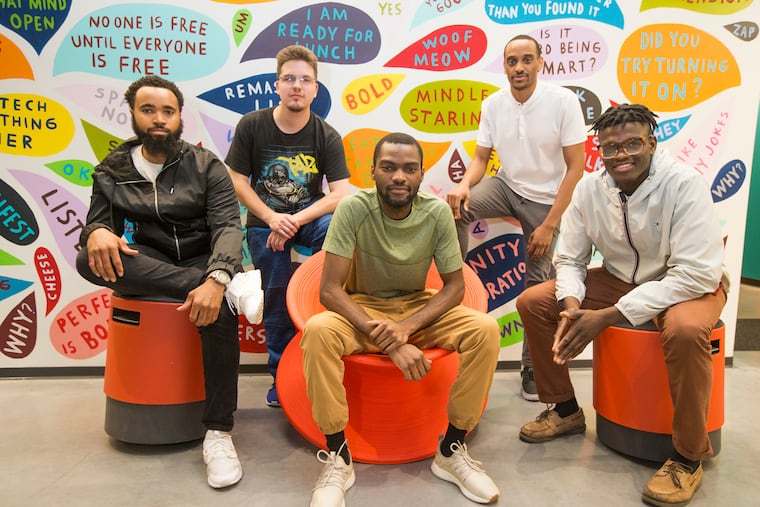Entrepreneur gives young tech developers a jump start on careers at Jumpbutton Studio
You don't have to wait to jump-start your dreams. At least, that's what Nicodemus Madehdou, founder of local high-tech start-up Jumpbutton Studio, believes.

This article is part of Made in Philly, a series about young residents shaping local communities.
As a high school freshman in 2012, Nicodemus Madehdou was determined to break into the tech-entertainment industry.
The self-taught coder mailed off internship applications each year to companies, including Google and Apple, but never landed an internship or received a response.
“There were absolutely no opportunities available to me unless I was a senior in college studying a specific degree," said Madehdou, 22.
But that wouldn’t stop his dreams.
While still a junior at New Foundations Charter High School in Holmesburg, Madehdou and three friends in 2015 cofounded Jumpbutton Studio, a tech start-up for young developers, especially of color, that gained national attention after creating educational videos and animations, computer applications, mobile applications, mobile games for android and apple phones, and websites.
Usually, “minorities have to go the extra mile to show we can accomplish what we’re trying to accomplish,” said Madehdou, of Mayfair, but “when we succeed and as we succeed more people of color and underrepresented people will be able to say they got the chance because [Jumpbutton] made it possible, [Jumpbutton] helped me get there.”
The company is run by 15 volunteers who have part-time jobs. It has produced about 25 projects since its inception — 10 for which it has been paid $2,000 to $10,000 in addition to 15 in-house or pro bono jobs. Among them: a mobile game that helps entrepreneurs learn about themselves, which debuted at Philly Tech Week in May and an animated campaign video created for former city council at-large candidate Eryn Santamoor. It had roughly $15,000 in revenue in 2018, but is on track to nearly double that amount by July, Madehdou said.
It’s been tough, but along the way Madehdou, a Liberian native, has racked up an impressive list of accolades — two Philly Geek awards in 2017; named a Young Futurist by The Root in 2017; honored at the White House twice in 2015 and 2016, once while still in high school; and named a 2018 Forbes Fellow. He’s also been invited to schools across the country to talk with teachers about how to educate students on STEM/STEAM, and help students jump-start their passion, especially in high-tech.
Jumpbutton represents a pathway for young developers to gain highly demanded skills in fields where minorities are underrepresented. The company has partnered with organizations and the city to bring in paid high school interns to work at its West Philly office this summer.
Students “need to see that the things that they love to do, when approached in the right way, can turn into a career that can make you a very successful adult in life, in community, … ” said New Foundations Charter principal Shira Woolf-Cohen, who allows her former student to return for projects, collaborations, and ninth-grade Career Awareness Day. She said the young developers from Jumpbutton “represent what we hope our youth end up like, and what we hope our youth embody.”
Cameron-Javon “CJ” Scott began volunteering at Jumpbutton in 2016, while still in high school, and never left.
“We’re doing things that most young kids wouldn’t do and it shows … we’re here to make a difference as well,” said Scott, now 19. And if we’re lucky, “it might motivate other kids who are younger.”
Jean Akingeneye noted that tech isn’t usually introduced as a career option for young people of color. Though urban youth tend to use a lot of technology, "they don’t know how this technology works,” he said.
“If we don’t make this space diverse, African American kids will be left out because that’s where the opportunities are right now: digital literacy, the digital computing, programming,” said Akingeneye, who leads Temple’s Urban Apps & Maps Studios, which teaches high school students how to code and involves them in projects that help build digital literacy skills.
Since 1990, STEM occupations have grown 79 percent, from 9.7 million to 17.3 million, according to a 2018 study by the Pew Research Center. Still, the disparity in racial representation persists. Blacks and Hispanics are underrepresented in science, tech, engineering, and math jobs, relative to their presence in the overall workforce, according to the research center.
Many black people in STEM positions, Pew said in 2018, believe minorities are underrepresented in the field due to “limited access to quality education, discrimination in recruitment and promotions and a lack of encouragement to pursue these jobs from an early age.” Another barrier Pew pointed to was the higher level education usually required for job positions.
Madehdou knows the depths of barriers for diverse groups. That’s why he created a way around them.
He moved to the United States in 2004 with his family, and soon found himself, at 8, struggling to adjust and embrace life in Philadelphia.
Technology and electronics eventually became a way for him to connect with others. He built friends through online gaming, who would go on to help co-found Jumpbutton.
He attempted college, but left Pennsylvania State University at Abington after spending a year taking an assortment of Information Technology classes that didn’t fully capture his interest.
Eileen Gadsden tells everyone Madehdou is “the next Steve Jobs.”
Gadsden is a strategist who helps Jumpbutton meet its financial goals and said its short-term revenue goal is $500,000. She said Madehdou “has figured out … how to educate young people, how to educate other people on how, why animation, digital is important.”
“All this was possible," Madehdou said, "because Philadelphia became my home and I became a member of its vast communities.”
Correction: A previous version of this story misidentified the source of a study on STEM occupations. The study was produce by the Pew Research Center.